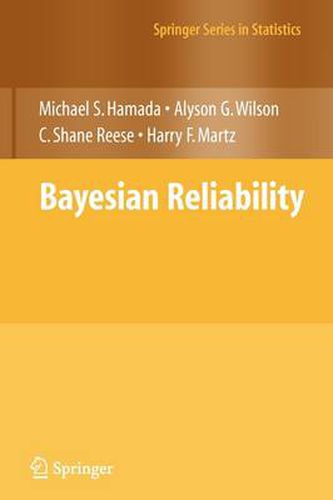Readings Newsletter
Become a Readings Member to make your shopping experience even easier.
Sign in or sign up for free!






This title is printed to order. This book may have been self-published. If so, we cannot guarantee the quality of the content. In the main most books will have gone through the editing process however some may not. We therefore suggest that you be aware of this before ordering this book. If in doubt check either the author or publisher’s details as we are unable to accept any returns unless they are faulty. Please contact us if you have any questions.
Bayesian Reliability presents modern methods and techniques for analyzing reliability data from a Bayesian perspective. The adoption and application of Bayesian methods in virtually all branches of science and engineering have significantly increased over the past few decades. This increase is largely due to advances in simulation-based computational tools for implementing Bayesian methods.
The authors extensively use such tools throughout this book, focusing on assessing the reliability of components and systems with particular attention to hierarchical models and models incorporating explanatory variables. Such models include failure time regression models, accelerated testing models, and degradation models. The authors pay special attention to Bayesian goodness-of-fit testing, model validation, reliability test design, and assurance test planning. Throughout the book, the authors use Markov chain Monte Carlo (MCMC) algorithms for implementing Bayesian analyses – algorithms that make the Bayesian approach to reliability computationally feasible and conceptually straightforward.
This book is primarily a reference collection of modern Bayesian methods in reliability for use by reliability practitioners. There are more than 70 illustrative examples, most of which utilize real-world data. This book can also be used as a textbook for a course in reliability and contains more than 160 exercises.
Noteworthy highlights of the book include Bayesian approaches for the following:
Goodness-of-fit and model selection methods
Hierarchical models for reliability estimation
Fault tree analysis methodology that supports data acquisition at all levels in the tree
Bayesian networks in reliability analysis
Analysis of failure count and failure time data collected from repairable systems, and the assessment of various related performance criteria
Analysis of nondestructive and destructive degradation data
Optimal design of reliability experiments
Hierarchical reliability assurance testing
$9.00 standard shipping within Australia
FREE standard shipping within Australia for orders over $100.00
Express & International shipping calculated at checkout
This title is printed to order. This book may have been self-published. If so, we cannot guarantee the quality of the content. In the main most books will have gone through the editing process however some may not. We therefore suggest that you be aware of this before ordering this book. If in doubt check either the author or publisher’s details as we are unable to accept any returns unless they are faulty. Please contact us if you have any questions.
Bayesian Reliability presents modern methods and techniques for analyzing reliability data from a Bayesian perspective. The adoption and application of Bayesian methods in virtually all branches of science and engineering have significantly increased over the past few decades. This increase is largely due to advances in simulation-based computational tools for implementing Bayesian methods.
The authors extensively use such tools throughout this book, focusing on assessing the reliability of components and systems with particular attention to hierarchical models and models incorporating explanatory variables. Such models include failure time regression models, accelerated testing models, and degradation models. The authors pay special attention to Bayesian goodness-of-fit testing, model validation, reliability test design, and assurance test planning. Throughout the book, the authors use Markov chain Monte Carlo (MCMC) algorithms for implementing Bayesian analyses – algorithms that make the Bayesian approach to reliability computationally feasible and conceptually straightforward.
This book is primarily a reference collection of modern Bayesian methods in reliability for use by reliability practitioners. There are more than 70 illustrative examples, most of which utilize real-world data. This book can also be used as a textbook for a course in reliability and contains more than 160 exercises.
Noteworthy highlights of the book include Bayesian approaches for the following:
Goodness-of-fit and model selection methods
Hierarchical models for reliability estimation
Fault tree analysis methodology that supports data acquisition at all levels in the tree
Bayesian networks in reliability analysis
Analysis of failure count and failure time data collected from repairable systems, and the assessment of various related performance criteria
Analysis of nondestructive and destructive degradation data
Optimal design of reliability experiments
Hierarchical reliability assurance testing